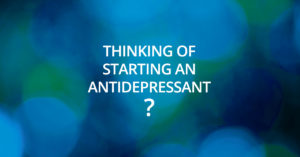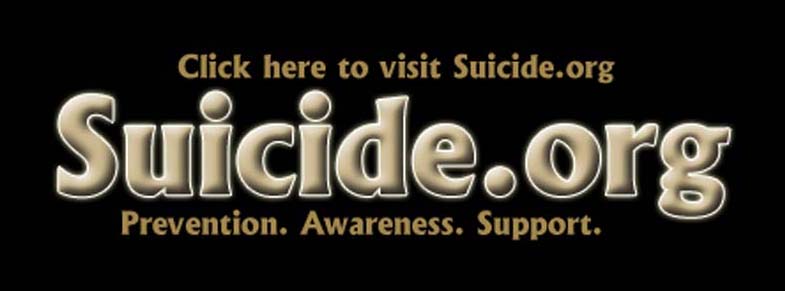DISCLAIMER: THIS IS NOT MEDICAL ADVICE! We do not employ doctors or licensed medical professionals, so we do not provide medical advice. Nothing presented here is a substitute for the advice of a DOCTOR or other licensed health care provider. Never stop, start or add medications or supplements to your health or mental health care regime without first checking for interactions or other problems, and thoroughly researching the substance. Before you employ any information here, consult your health care professional. No information here is the result of valid clinical trials.
The Agony of Akathisia:
In their Own Words - What is it?
It's difficult for those of us who have never experienced the powerful sensations of akathisia, a potential but horrific side effect of many psychotropic medications, to truly understand what those afflicted have gone through.
- The words of people who have experienced it firsthand can give us a glimpse into the utter torture that it is to live with this dreadful disorder, which creates a sense of dread, restlessness and agitation like little else.
- Phrases like "a sense of doom," "a living nightmare," and "hopelessness for no reason" are just a sprinkling of descriptions people who have suffered through this disorder share.
- David Foster Wallace, a writer who took his life in 2008, explains the desire for death when afflicted with this condition this way: "When the flames get close enough, falling to death becomes the slightly less terrible of two terrors. It's not desiring the fall; it's terror of the flames."
"The mechanisms that lead a drug to cause suicide are the same that produce violence. The first of these is akathisia. Akathisia is a state of increased tenseness, irritability, restlessness, insomnia and a feeling of being intensely uncomfortable."
This accurate description does not fully capture how terrible the experience of akathisia can be. The following comments were posted on the internet by people about their experience of akathisia:
- "I feel like I have worms crawling under every inch of my skin."
- "I can't stop squirming, so sleep/rest is impossible no matter how exhausted I am…"
- "My mouth felt like I was sucking on a battery; tingling, electrical."
- "The feeling of suffocation was worse; at the peak it felt like I was being burned alive. I couldn't stop crying. I wanted to die, every fiber of my being wanted to be dead."
- "It was like a wave of sheer terror and panic. I would have done anything to make it stop."
- "has anybody experienced a sense of doom from their akathisia? When I get akathisia, it feels like it's going to last forever and stay the same or get worse, that all that is or will be good for me has gone from the world."
- "It felt like someone close to me just died and I couldn't stop crying. I've never felt such doom and hopelessness for no reason."
- "It was an anxiety so intense and deep-seated I thought I was losing my mind."
- "but damn, akathisia is a living nightmare, makes everything else I've suffered from up till this point look like child's play."
- "There's no sense of DOOM and DARKNESS like what is felt during Akathisia. It's inexplicable. I knew if I didn't just die from it, I would kill myself if it didn't let up. I was so sure I absolutely had to die. Because I could NOT STAND feeling that way one more minute."
- "Yesterday I had a strong urge to kill myself not because I want to die but because I want to kill myself."
Antidepressants and Violence
Perhaps the best description of all was put forward as a comment on the Aug 3 RxISK.org post The Man Who Thought he was a Monster: Antidepressants and Violence:
The best description I have ever come across of why some people die by suicide which may go some way to help people understand - especially those angry, devastated and confused by the loss of a loved one to SSRIs - is by David Foster Wallace (who was treated for years with Nardil; some surmising that it may have been withdrawal from Nardil which led to his suicide):
- "The so-called 'psychotically depressed' person who tries to kill herself doesn't do so out of quote 'hopelessness' or any abstract conviction that life's assets and debits do not square. And surely not because death seems suddenly appealing. The person in whom its invisible agony reaches a certain unendurable level will kill herself the same way a trapped person will eventually jump from the window of a burning high-rise. Make no mistake about people who leap from burning windows. Their terror of falling from a great height is still just as great as it would be for you or me standing speculatively at the same window just checking out the view; i.e. the fear of falling remains a constant. The variable here is the other terror, the fire's flames: when the flames get close enough, falling to death becomes the slightly less terrible of two terrors. It's not desiring the fall; it's terror of the flames. And yet nobody down on the sidewalk, looking up and yelling 'Don't!' and 'Hang on!', can understand the jump. Not really. You'd have to have personally been trapped and felt flames to really understand a terror way beyond falling."
- In his book Medication Madness, Dr. Peter Breggin discusses akathisia under the title "A Painful Dance of Death." He describes akathisia as "a drug-induced neurological disorder that is known to drive people to suicide and violence, and to madness"*. He notes that "while studies of SSRI-induced akathisia vary greatly…the weight of evidence confirms that it is common." He cites various estimates that range from 9.7 % of users to 25% of users.** The intensity of the condition can range from discomfort to agony. In his book Brain-Disabling Treatments in Psychiatry, he states:
- "Patients suffering from akathisia often use electrical metaphors or descriptions such as "electricity going through my veins" or "shocks in my head". Words like excruciating, torture, and indescribable are commonly used. Patients often say they would rather die than live with akathisia… these individuals seen to be describing physical phenomena, as if they are being tortured from the inside out."***
- Akathisia is a fairly common side effect of SSRI (and other) medications. In extreme cases it can cause such mental and physical agony that people are driven to do things they would not normally do.
*Medication Madness: A Psychiatrist exposes the dangers of mood- altering medications, by Peter Breggin, St. Martin's Press, 2008, Page 15
**Ibid, Page 16
***Brain-Disabling Treatments in Psychiatry, by Peter Breggin, second edition, Springer Publishing 2008, Page 48
Akathisia
- Akathisia Alliance for Education
- https://withdrawal.theinnercompass.org/symptom/akathisia?fbclid=IwAR1hRMTYng-GwHw2XOXU5-wFqj6ZilS4fp83HL-AZc3pL4Bep7wJEdY1Pkg
Author: RxISK Medical Team
Last updated: 2018
Akathisia (I Can't Sit Still), is also available on iTunes, Spotify, Amazon and Google Music.
What is akathisia?
Akathisia is an emotional state caused by over 100 different drugs, primarily antidepressants and antipsychotics, but also antibiotics, anti-hypertensives and others. It causes suicidality, homicidality and other disturbances of behavior - See Left Hanging.
It can range from a constant and disturbing mental unease through to an intense emotional turmoil - and mental restlessness. This can be accompanied by physical discomfort, an inability to remain still, or an obvious motor restlessness or fidgetiness. The problems caused by treatment can in many cases be worse than the illness being treated.
It may start within an hour of a first pill or only appear after days, weeks or months. It may only start when the dose of the drug is increased or decreased, or the drug is stopped.
Akathisia is often misleadingly described as a movement disorder.
There are four types of akathisia depending on when the problem occurs and how long it lasts:
- Acute akathisia develops shortly after starting a drug.
- Tardive akathisia develops months after starting the drug.
- Withdrawal akathisia occurs when stopping a drug.
- Chronic akathisia is any type that lasts for more than six months.
Symptoms
Symptoms of akathisia can include:
- anxiety or agitation
- restlessness
- feeling emotionally uneasy
- dysphoria - feeling bad or depressed
- difficulty sleeping
- distress or panic attacks
- difficulty sitting still; feeling the need to keep moving eg. pacing back and forth
- a feeling of wanting to jump out of your skin
- dark and unpleasant thoughts
- strange and unusual impulses, often of an aggressive nature
- homicidality
- suicidality
Sufferers often find it very difficult to explain exactly what is wrong, even though they may be in unbearable distress.
In milder cases, some people don't realize how badly they are affected by the problem until they stop the drug or lower the dose. See Life on Drugs and Suicide is Painless.
How common is akathisia?
Significant symptoms of akathisia occur in:
- around 20% of people on an antidepressant
- at least 50% of people on low doses of an antipsychotic
- up to 80% or more people on higher doses of an antipsychotic
- 5% or more people on doxycycline, other antibiotics, and other medications
- healthy volunteers as well as "patients"
On antidepressants, it is most commonly seen in those drugs that inhibit serotonin reuptake. These include selective serotonin reuptake inhibitors (SSRIs), serotonin-norepinephrine reuptake inhibitors (SNRIs), and most tricyclics. All other antidepressants can also cause it but with subtle differences between different drug groups.
In a healthy volunteer trial of the antidepressant Zoloft (sertraline) from 1983, the trial had to be abandoned before the end of the first week due to every participant displaying signs of akathisia.
A study of healthy volunteers taking haloperidol done by King and colleagues found that up to 50% taking doses as low as 4 mg may feel uncomfortable, ill at ease with themselves, and unable to settle. Some volunteers found it almost impossible to remain in the room, but at the same time found it very difficult to explain what was wrong [1].
Many psychiatrists who have tried antipsychotics have said it was close to the worst experience of their lives.
Healy and colleagues found similar results to the King study, with the extra twist that discomfort and irritability were still clearly present in some volunteers up to a week later [2-4]. Others have found similar effects [5, 6].
Descriptions
Some of the earliest descriptions of akathisia were from people taking reserpine for blood pressure problems in the mid-1950s ie. people with no nervous problems [7].
- "Increased tenseness, restlessness, insomnia and a feeling of being very uncomfortable".
- "On the first day of treatment he reacted with marked anxiety and weepiness, on the second day felt so terrible with such marked panic at night that the medication was cancelled".
- "The first few doses frequently made them anxious and apprehensive. They reported increased feelings of strangeness, verbalised by statements such as 'I don't feel myself' or 'I'm afraid of some of the unusual impulses I have'".
Or as David Foster Wallace put it before he died:
- "The person in whom its invisible agony reaches an unendurable level will kill herself the same way a trapped person will jump from the window of a burning high-rise… The terror of falling from a great height is still just as great… It's not desiring the fall, it's the terror of the flames… You'd have to have personally been trapped and felt flames to understand a terror beyond falling".
Bruce Springsteen seems to be describing - See Here:
- "During this period, I was so profoundly uncomfortable in my own skin that I just wanted OUT. It feels dangerous and bring plenty of unwanted thoughts. I was uncomfortable doing anything. Standing …walking …sitting down…everything brought waves of an agitated anxiety that I'd spend every waking minute trying to dispel. Demise and foreboding were all that awaited and sleep was the only respite. During waking hours, I'd spend the day trying to find a position I would feel all right in for the next few minutes. I was not hyper. In fact, I was too depressed to concentrate on anything of substance".
Diagnosis
Despite the high incidence and seriousness of akathisia, both patients and doctors often have a poor understanding of the problem. Some healthcare staff may not have heard of it.
A common response from doctors when presented with symptoms of akathisia is to increase the dose, which then worsens the problem.
If your symptoms are severe and you find yourself in the emergency department of a hospital, it is similarly likely that you will be regarded as having a worsening illness, unless you are able to clearly explain that you are suffering an adverse drug reaction.
Akathisia is commonly misdiagnosed as:
- worsening depression
- anxiety disorder
- restless legs syndrome
- a nervous breakdown
- psychotic decompensation
- If you think that you might be suffering from this side effect, it may be helpful to specifically use the term "akathisia" when speaking to your doctor. You could also ask for this term to be noted in your records, to show that you clearly identified the problem as a drug side effect.
Mentioning general terms such as agitation or anxiety are more likely to be mistaken for a mood disorder.
For friends and family
If you have a friend or family member who recently started antidepressants or antipsychotics, or even an antibiotic, you may want to watch for signs of akathisia. The problem can sometimes be difficult to recognize in another person as there may be no obvious restlessness. However, the person may:
- look tense
- appear distracted or pre-occupied
- seem not quite themselves
- become quick tempered or impulsive
- seem emotionally troubled
If these problems only appeared after being put on medication, or became worse since they started the medication, they may be suffering from akathisia.
There is a good chance that your friend or family member may not know about akathisia and may not understand what is happening to them. Bringing it to their attention may save their life.
If you know someone who is already on an antidepressant or antipsychotic, it is important to be aware that changing the dose, stopping the drug or changing to a different drug could trigger akathisia. Therefore, someone who is currently on long-term medication and doing well can still be at risk if changes are made to their treatment.
Treating akathisia
Mental health services are poor at recognizing the problem and may make it worse by adding in further treatment. Depending on the circumstances, the most appropriate course of action may be to lower the dose or stop the drug completely.
We are clearly not recommending you take further dangerous medication, but you may be told that akathisia sometimes responds to:
- Trazodone
- a benzodiazepine - this is mostly for SSRIs, SNRIs and tricylics
- propranolol (beta blocker)
- red wine for antipsychotics
In a proportion of those who have been on antidepressants or antipsychotics for a long time, it may take several months or more after discontinuation of the drug for the akathisia to wear off. For some, a residual amount may persist indefinitely, leaving the person unable to feel completely relaxed or emotionally content.
See also
- Side Effects of Antidepressants
- Side Effects of Antipsychotics
- Guides & Papers
- Akathisia: on the high index of suspicion list(external link)
The best book on the experience and consequences of akathisia is Katinka Newman's The Pill that Steals Lives.
Wendy Dolin, a woman whose husband developed akathisia on an SSRI and committed suicide, has set up a website with educational videos and training programs - Medication Induced Suicide Prevention and Education in Memory of Stewart Dolin - MISSD. This contains some great material.
References
- King DJ, Burke M, Lucas RA. Antipsychotic drug-induced dysphoria. Br J Psychiatry 1995; 167:480-482.
- Healy D, Farquhar G. Immediate effects of droperidol. Hum Psychopharm 1998; 13:113-120.
- Jones-Edwards G. An eye-opener. OpenMind 1998; September:12,13,19.
- Jones-Edwards G. On the receiving end. New Therapist 2000; 7:40-43.
- Belmaker RH, Wald D. Haloperidol in normals. Br J Psychiatry 1977; 131:222-223.
- Kendler KS. A medical student's experience with akathisia. Am J Psychiatry 1976; 133:454.
- Healy D, Savage M (1998) Reserpine exhumed. Brit J Psychiatry 172: 376-378.
CHW FAQ and Key Definitions
These are simple questions, mostly with short answers. The key words will help you search the “CHW Files” list for documents giving more detail. Use the “Search” box on the CHW FB page to see what others have said about (key word) and see what they have experienced.
Read MoreCHW Thyroid Issues
Here is yet another reminder that Cymbalta – whether on it or reducing – can lead to mis-diagnosis in other areas.
Cymbalta has this scary ability to “mimic” other health problems, including Thyroid issues.
CHW Finding Holistic, Functional & Integrative Practitioners
If your doctor is prescribing Cymbalta and other toxic psychotropics, you may be better served by finding a doctor that will try to help you find the cause of your condition rather than masking it.
Read MoreCHW Tapering Off Multiple Drugs
There are three schools of thought on tapering multiple drugs: 1) Taper one drug at a time in order to connect decreases to withdrawal symptoms.2) Taper all at once – very slowly 3) The stair-step method, where one drug is slow tapered for awhile, and then tapering that drug is stopped before tapering the next drug begins.
Read MoreCHW Thinking of Starting an Antidepressant?
Informed consent and questions for your doctor. For example: When doctors say this… ask this.
Read MoreCHW Nutritional Support that Helps to Heal the Body and Brain
The connection between mental health, diet, nutrition and gut health. Diet, nutrition, and chronic systemic inflammation are linked to health and mental health disorders such as anxiety, depression, bipolar, and even schizophrenia.
Read MoreLooking for help with something?
Search our site below...
Please take the time to report your adverse symptoms from Cymbalta and Cymbalta withdrawal to the FDA. Call 1-800-332-1088 ![]()
© 2019 Healing America Now








